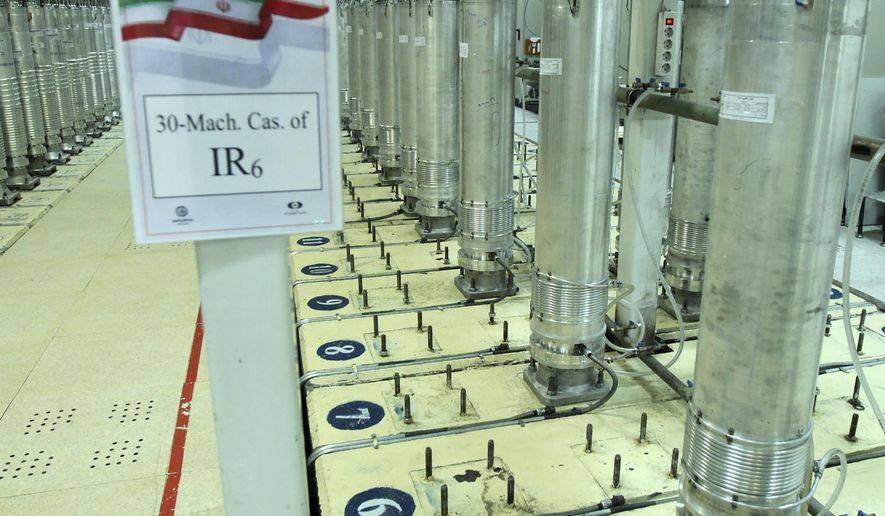Iran is accelerating its nuclear program by stockpiling enriched uranium — the material needed to create atomic bombs — in violation of U.N. Security Council resolutions.
A confidential report this week by the U.N.’s nuclear watchdog agency said Iran’s stockpile has reached a level 22 times above the limit set by the 2015 nuclear accord between Tehran and world powers.
The findings by the International Atomic Energy Agency suggest that Iran has advanced the program dramatically since 2018, when then-President Trump pulled the U.S. out of the accord on grounds that it had failed to curtail Tehran’s funding of terrorist proxy groups like Hamas and Hezbollah.
The IAEA’s confidential report, which was reviewed and first publicized Wednesday by Agence France-Presse, said Iran’s total enriched uranium stockpile was estimated at nearly 9,900 pounds as of Oct. 28, up by more than 1,500 pounds from August.
The limit in the 2015 accord was set at roughly 500 pounds.
Under the accord, the U.S. and other world powers gave Iran billions in economic sanctions relief in exchange for promises from Tehran to significantly curb the country’s nuclear enrichment activities and allow IAEA inspectors access to Iranian nuclear facilities.
Washington and its European allies have long accused Iran of clandestinely developing nuclear weapons in the facilities — an allegation Tehran denies.
The nuclear accord has unraveled since Mr. Trump pulled the U.S. out of it in 2018 and began pushing a “maximum pressure” campaign of new economic and oil sanctions against Iran. China, which was party to the 2015 deal, has increased its purchases of Iranian oil in recent years despite the renewed U.S. sanctions.
In addition to this week’s confidential report by the IAEA, the U.N. watchdog publicly accused Iran of blocking the work of international nuclear inspectors.
Tehran reportedly withdrew the accreditation of eight top U.N. inspectors in September.
IAEA officials said Wednesday that the withdrawals were “extreme and unjustified” and “directly and seriously affected” the agency’s work, Agence France-Presse reported.
The separate, confidential report seen by the news agency said that “Iran’s stance is not only unprecedented, but unambiguously contrary to the cooperation that is required.”
The Biden administration came to office in 2021 seeking to reinstate the accord. Administration officials pushed to renew nuclear talks with Tehran through early this year, but the effort failed amid resistance from the Iranian side.
• Guy Taylor can be reached at gtaylor@washingtontimes.com.




Please read our comment policy before commenting.